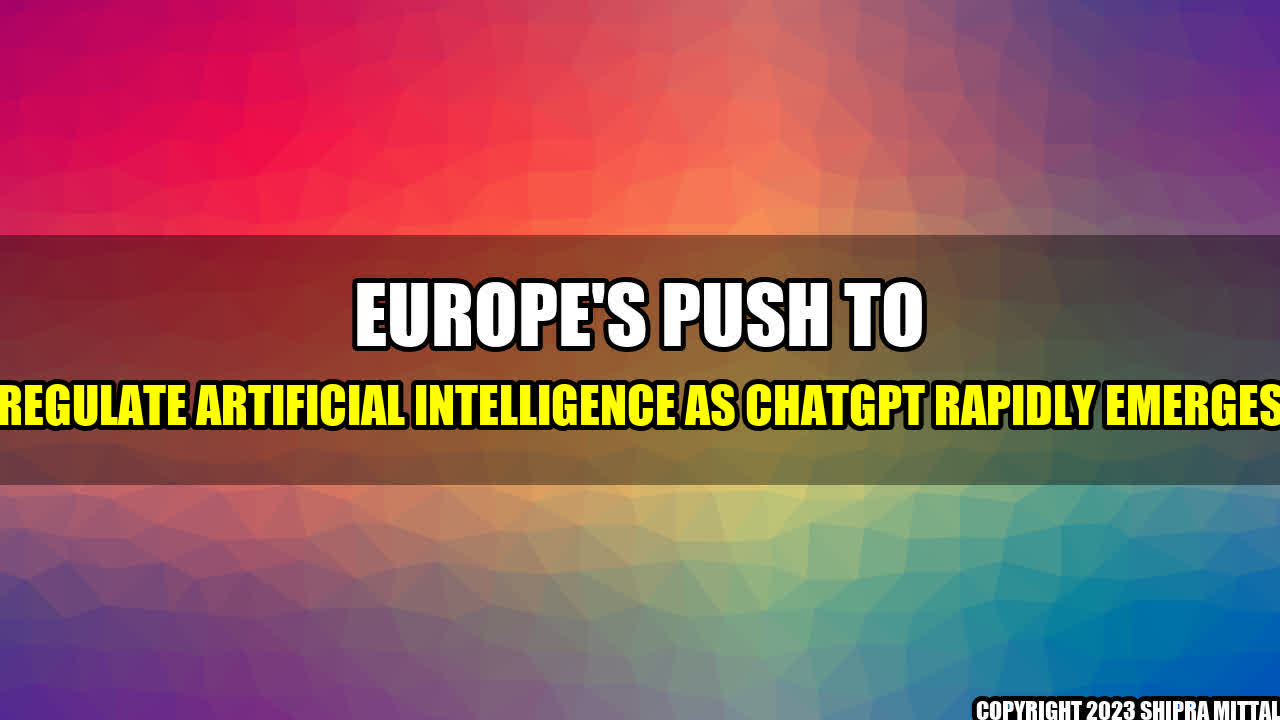An Interesting Story: The Rise of ChatGPT
Imagine you are chatting with a friend, discussing a recent news article, and suddenly your friend shares a startling fact that you had never heard before. You ask them how they knew that, and they casually mention that they were chatting with an artificial intelligence program, like ChatGPT.
That scenario is becoming more common as ChatGPT, a cutting-edge AI language model, rapidly emerges. Developed by OpenAI, ChatGPT can simulate human-like conversations, understand natural language, and generate writing that sounds like it was written by a human.
While ChatGPT has a wide range of potential applications, from personal assistants to customer service chatbots, it also raises important ethical questions about the role of AI in our society. This is why Europe is pushing to regulate artificial intelligence, including ChatGPT, to ensure that these cutting-edge technologies are developed and deployed responsibly.
Quantifiable Examples: The Need for AI Regulation
The need for AI regulation is evident in some of the negative consequences that have resulted from the unregulated development and deployment of AI technologies. For example:
- Amazon's AI recruiting tool, which was developed to help hiring managers identify top candidates, turned out to be biased against women. The tool was trained on a dataset of resumes that were predominantly male, which led it to classify resumes with words like "women's" as less desirable.
- A facial recognition system used by police in the UK was found to be inaccurate when analyzing images of people with dark skin tones. This raised important questions about racial bias and discrimination in the use of AI technologies in law enforcement.
- The use of predictive algorithms in the criminal justice system has been criticized for reinforcing racial biases in decisions about bail, sentencing, and parole.
These examples underscore the importance of regulating AI technologies to ensure that they are developed and deployed responsibly, with proper safeguards to mitigate unintended consequences and protect important societal values such as fairness, transparency, and accountability.
: The Human Side of AI Regulation
As we consider the need for AI regulation, it's important to remember that these technologies can have a profound impact on people's lives. Here are a few personal anecdotes that illustrate some of the stakes involved:
- A mother of a child with a rare medical condition describes how AI-powered chatbots have become a critical source of information and emotional support for families navigating complex medical issues.
- A small business owner shares how an AI-powered inventory management system has helped her reduce waste and streamline operations, saving her time and money.
- A college student talks about the anxiety she feels when taking online tests that use AI-powered anti-cheating algorithms, which can flag innocent behaviors as suspicious and result in false accusations of cheating.
These personal stories highlight the complexity of the issues at stake in the regulation of AI technologies and the need to balance the potential benefits with the risks and unintended consequences.
Practical Tips: What You Can Do to Help Regulate AI
If you're interested in the regulation of AI technologies, there are a few practical steps you can take:
- Stay informed: Follow news and analysis from reputable sources, and engage with experts and stakeholders in the field.
- Advocate for responsible AI: Use your voice to push for ethical and responsible AI development and deployment, and urge policymakers and industry leaders to prioritize these values.
- Participate in public debate: Attend public forums, write letters to your representatives, and engage in public discussions about the regulation of AI technologies.
These steps can help ensure that AI technologies are developed and deployed in ways that align with our values and that benefit society as a whole.

Akash Mittal Tech Article
Share on Twitter Share on LinkedIn